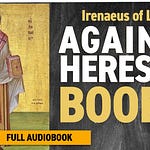The Didache, which means "teaching" in Greek, is a first century Christian document that presents practical instructions for living the Christian life. From the start, the writer is emphatic that “there are two paths to follow: one is life and the other is death." And that "There is a profound difference between the two.” This theme of life and death is weaved throughout the manuscript. As one of the earliest Christian documents, it comes as no surprise that it, much like Paul's letters, contains a number of moral teachings; some outline the Ten Commandments, others reaffirm the teachings of our Lord Jesus Christ, and still others that draw practical conclusions from these teachings.
In addition to giving instruction on what not to do, it contains examples of what one should do. The writer encourages Christians to “honor” and “remember those who speak the word of God” and “study the saints each day…[to] find comfort in their words.” In this same passage there is a call to “confess [sins]…in the congregation.” Elsewhere, the author exhorts Christians to “be patient and merciful, innocent, quiet and honorable, always paying attention to what [they have] been taught.” Interestingly, though, the writer does not condemn those that cannot take upon themselves the full cross of Christ. Indeed, he remarks pastorally: “if you are able to carry the whole yoke of the Lord, your life will be complete. If you cannot do this, do what you are able.” This statement demonstrates an incredible pastoral flexibility present from the very beginning of the formation of Christian doctrine – one which stands in stark contrast to the black-and-white theological rigorism present in our day. Elsewhere, in chapter seven, we see a similar spirit with regards to baptismal form.
Some might be surprised to find that this first century document references and condemns the acts of abortion and infanticide: “Do not kill an unborn child by abortion, nor kill a newborn child.” This goes to show that, from the outset, the Church was aware of these practices (abortion or infanticide) and strictly condemned them. As an added point of interest, the document also contains lucrative information about early Church life: it speaks about baptism (in chapter 7), fasting and prayer (in chapter 8), the Eucharist (in chapter 9), and ordaining Bishops and Deacons (in chapter 15).
In keeping with the two path theme, the morality of the Didache hinges on the the fact that the “path of life” and the “path of death” are diametrically opposed to one another. Yet in keeping with this theme the author embodies a pastoral spirit – clarifying, in a sense, that one's direction – that is, the direction one is heading – is more important than how perfectly one walks that direction. In all, the text seems to serve as a practical extension of the morality found in the Holy Scriptures – one that sheds light on seemingly harmless habits to show their natural end: death.
You can support our efforts to provide professionally produced audiobooks by becoming a member of the substack or becoming a Patron on Patreon













Share this post